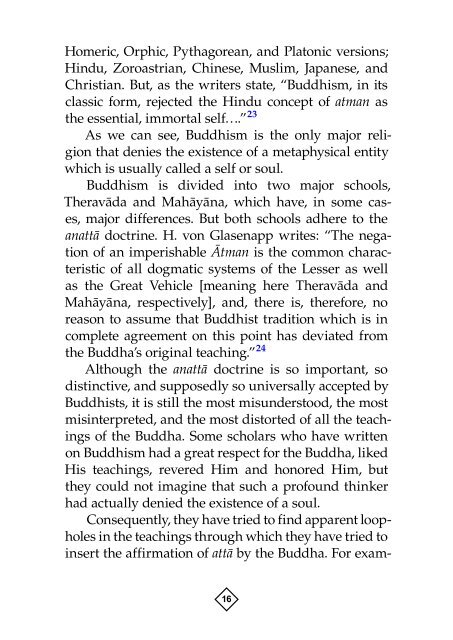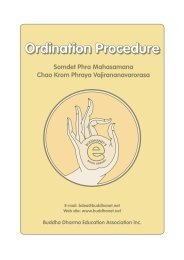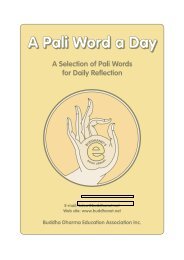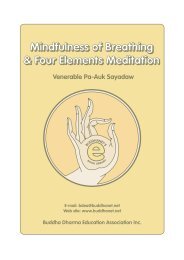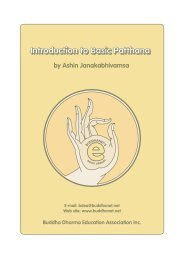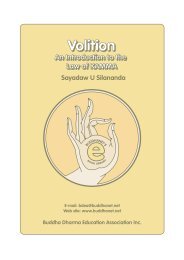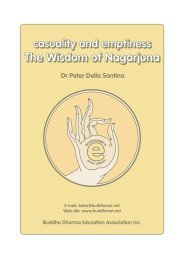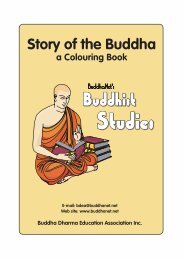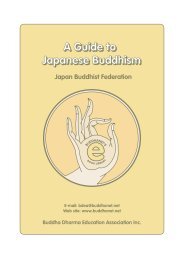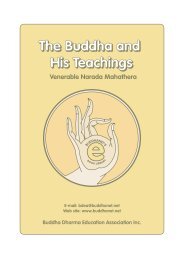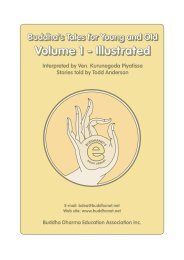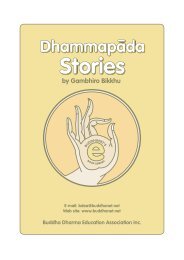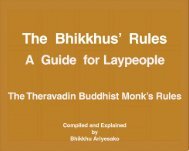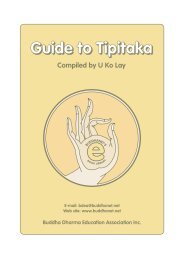No Inner Core: An Introduction to the Doctrine of Anatta - BuddhaNet
No Inner Core: An Introduction to the Doctrine of Anatta - BuddhaNet
No Inner Core: An Introduction to the Doctrine of Anatta - BuddhaNet
You also want an ePaper? Increase the reach of your titles
YUMPU automatically turns print PDFs into web optimized ePapers that Google loves.
Homeric, Orphic, Pythagorean, and Pla<strong>to</strong>nic versions;<br />
Hindu, Zoroastrian, Chinese, Muslim, Japanese, and<br />
Christian. But, as <strong>the</strong> writers state, “Buddhism, in its<br />
classic form, rejected <strong>the</strong> Hindu concept <strong>of</strong> atman as<br />
<strong>the</strong> essential, immortal self….” 23<br />
As we can see, Buddhism is <strong>the</strong> only major religion<br />
that denies <strong>the</strong> existence <strong>of</strong> a metaphysical entity<br />
which is usually called a self or soul.<br />
Buddhism is divided in<strong>to</strong> two major schools,<br />
Theravàda and Mahàyàna, which have, in some cases,<br />
major differences. But both schools adhere <strong>to</strong> <strong>the</strong><br />
anattà doctrine. H. von Glasenapp writes: “The negation<br />
<strong>of</strong> an imperishable âtman is <strong>the</strong> common characteristic<br />
<strong>of</strong> all dogmatic systems <strong>of</strong> <strong>the</strong> Lesser as well<br />
as <strong>the</strong> Great Vehicle [meaning here Theravàda and<br />
Mahàyàna, respectively], and, <strong>the</strong>re is, <strong>the</strong>refore, no<br />
reason <strong>to</strong> assume that Buddhist tradition which is in<br />
complete agreement on this point has deviated from<br />
<strong>the</strong> Buddha’s original teaching.” 24<br />
Although <strong>the</strong> anattà doctrine is so important, so<br />
distinctive, and supposedly so universally accepted by<br />
Buddhists, it is still <strong>the</strong> most misunders<strong>to</strong>od, <strong>the</strong> most<br />
misinterpreted, and <strong>the</strong> most dis<strong>to</strong>rted <strong>of</strong> all <strong>the</strong> teachings<br />
<strong>of</strong> <strong>the</strong> Buddha. Some scholars who have written<br />
on Buddhism had a great respect for <strong>the</strong> Buddha, liked<br />
His teachings, revered Him and honored Him, but<br />
<strong>the</strong>y could not imagine that such a pr<strong>of</strong>ound thinker<br />
had actually denied <strong>the</strong> existence <strong>of</strong> a soul.<br />
Consequently, <strong>the</strong>y have tried <strong>to</strong> find apparent loopholes<br />
in <strong>the</strong> teachings through which <strong>the</strong>y have tried <strong>to</strong><br />
insert <strong>the</strong> affirmation <strong>of</strong> attà by <strong>the</strong> Buddha. For exam-<br />
16


